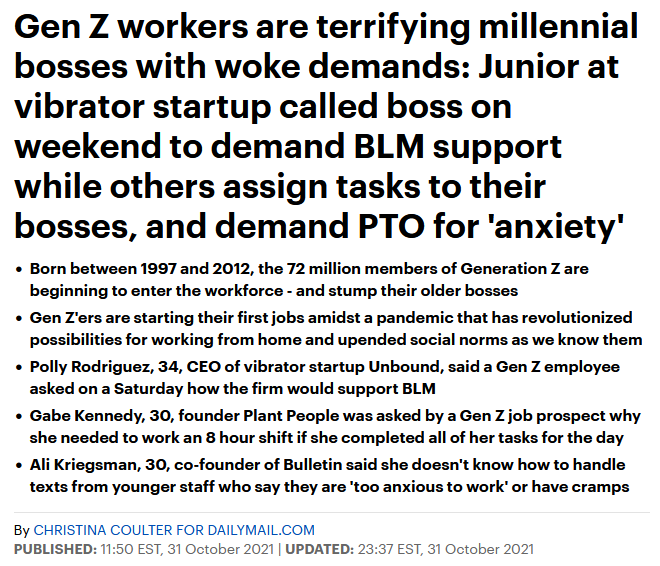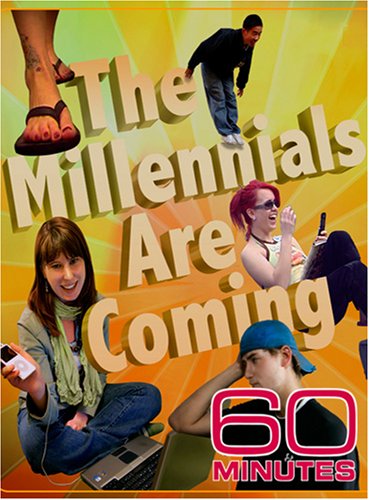Pitting generations against each other benefits corporate media outlets owned by wealthy elites because it draws attention from other, more consequential class divides.
By Olivia Riggio, FAIR.org
Millennials, you’re not young and cool anymore. Gen Z thinks your skinny jeans are basic, your side-parted hair is dorky and your choice of the laughing/crying emoji is embarrassing. Moreover, they’ll take sick days for period cramps, ask higher-ups to take on projects and ask if your organization celebrates Juneteenth.
This, at least, is what you’ll glean from the New York Times’ trend piece, “The 37-Year-Olds Are Afraid of the 23-Year-Olds Who Work for Them” (10/28/21).

The lighthearted feature highlighting intergenerational conflict isn’t unique. Older people have been rolling their eyes at “kids these days” for decades—and the kids have been rolling their eyes right back. The phenomenon has even been documented by researchers.
True to the genre, the Times piece starts with quirky anecdotes about Millennial professionals (born between 1981 and 1996) who are insecure about their emoji choices and worry about being seen as “uncool” by younger employees. (Those employees might call their bosses “cheugy“—internet slang for trying too hard to be trendy and hip, coined in 2013 but made popular by Gen Zers on TikTok in 2021.)
But the story quickly shifts to outline the “new boldness” with which Gen Z (1997–2012) dictates not only what’s trendy, but also the way corporate America operates: They have the audacity to take days off for mental health. They don’t understand why they need to be at their desks until 5:00 if they finish their work early. They demand the company publicly speak out against the murder of George Floyd.
The article is written by Emma Goldberg, a Millennial, and includes nine sources, seven of whom are Millennials. Only one is a Gen Zer, and the other is an organizational psychologist whose age isn’t included. Excluding the once-quoted psychologist, all sources (even the Gen Zer) are higher-ups at their companies. Seven are founders and/or CEOs, and one is a manager.
‘Entitled’ Demands

A Daily Mail article (10/31/21) recycling the Times piece with even more sensationalism included a headline as loaded as it is long:
Gen Z Workers Are Terrifying Millennial Bosses With Woke Demands: Junior at Vibrator Startup Called Boss on Weekend to Demand BLM Support, While Others Assign Tasks to Their Bosses, and Demand PTO for ‘Anxiety’
“Generation Z workers are terrifying their millennial bosses with a series of woke and entitled demands,” the piece starts,
including that their companies support BLM, provide paid time off for “anxiety” and telling the CEOs to do the assignments themselves.
The snarky use of scare quotes for “anxiety” serves to diminish one of the most prevalent mental health issues—affecting more than 18% of US adults—as a generational trend. But mental hygiene’s impact on workplace performance isn’t a fad of the TikTok generation: An Anxiety & Depression Association of America survey found that 56% of people say anxiety and stress impact their work performance. This survey took place in 2006, before most Gen Zers entered middle school, let alone the workplace.
It’s true that young people report higher rates of mental illness than older adults, but maybe there’s more at work here than younger generations’ supposed lack of grit.
Any combination of present-day factors could lead to an uptick in these numbers. There are even positive changes, like a general decrease in mental illness stigma, which research has found to decrease both suicidality and unemployment. But negative present-day realities also put an outsized burden on young people—for example, the psychological effects of climate change (Epidemiology and Psychiatric Studies, 4/18):
A 2021 study by the Lancet Planetary Health journal surveyed 10,000 young people across 10 countries and found that 56% of them agree with the statement, “humanity is doomed,” as it relates to climate change. Forty-five percent of 16–25-year-olds said climate-related anxiety and distress is affecting their daily lives and ability to function normally.
More than half of young people across 10 countries believe humanity is doomed, but instead of addressing how this profound distress might affect Gen Z work habits, publications like the Times and the Daily Mail prefer to frame young employees as audacious and “entitled,” highlighting their quirky affinity for Y2K fashions rather than their genuine and grounded concerns.
‘Woke’ Demands

The Daily Mail’s use of the word “woke” as an insult is also notable. The term, which has been bastardized by the right as a new pejorative synonym for “politically correct” or “overly sensitive” (FAIR.org, 11/17/21), comes from African-American Vernacular English and dates back to the 1930s, when it simply meant to be alert to racial prejudice and discrimination (Independent, 1/22/21).
Some of the “woke” and “entitled” demands that shocked Millennial higher-ups: taking sick days due to period cramps (which can, indeed, be debilitating for people with certain conditions, like endometriosis, which affects up to 10% of women), and asking about the company’s response to racist violence.
While some companies are welcoming the chance to reckon with disparities historically perpetuated by corporate America, “some managers are also struggling to balance the demands of their employees for political engagement with their own sense of what’s appropriate for their brands,” the Times article said.
One source said she thinks it’s “shortsighted” to call out higher-ups for their “missteps.” “Is it worth the social clout of getting gratification on social media but then trashing someone who could continue to help you professionally?” she asks.
Depending on the “misstep” at issue, a better question would be, “Do you want professional help from an unethical leader?”
Stereotype Déjà Vu

If these stereotypes of Gen Z sound familiar, it’s because just a few years ago, Millennials were described nearly identically. The Times piece quoted a 2007 60 Minutes segment called “The ‘Millennials’ Are Coming” (11/11/07). “These young people tell you what time their yoga class is,” the segment warned.
The difference, according to the Times, is that young people entering the workforce on the heels of the 2008 financial crisis were grateful to have any work. Their industriousness gave rise to an industrious culture of “hustling.” Meanwhile, Gen Z is entering the workforce during a pandemic that normalized remote work and shook up the typical 9–5 schedule. The piece cited an anecdote from a Millennial CEO:
Mr. Kennedy interviewed a Gen Z candidate for a full-time position who asked if she could stop working for the day once she’d accomplished the tasks she’d set out to do. He responded that her role was expected to be a nine-to-five.
Realistically, that candidate’s question shouldn’t have been so shocking: A recent UK study suggested that during a 9–5 workday, a typical worker is only productive for a little more than two hours. A “results-oriented work environment” (ROWE), which focuses on productivity rather than hours at a desk, is an established corporate strategy (Harvard Business Review, 7/27/21), pioneered (for a time) by Best Buy in 2005, and since adopted by a number of businesses, mainly in the tech sector.
The association of Millennials with the industrious 9–5 “hustle” has not always been the case. Like Gen Z, when they first entered the workforce, they were also characterized as “lazy” and “entitled” (Time, 5/9/13).
They also preferred “videoconferencing and anything that is going to save the most time,” desired “interaction with management” and expected “that a company embraces certain social values — for example, supporting local charities or hiring ex-offenders—even if the employer is not a social enterprise” (Cleveland Plain Dealer, 6/18/17).
Just five years ago, the New York Times (3/19/16), in a piece labeled “What Happens When Millennials Run the Workplace?,” associated Millennials with “a sense of entitlement, a tendency to overshare on social media, and frankness verging on insubordination.”
As recently as 2018, Sanford Health characterized Millennials as the “wellness generation” who value work-life balance; emphasize mental, physical and social health; want to be valued for results, and not hours “clocked”; and want their organization’s higher purpose to be clear.
In these pieces, the terms “Millennials” and “Gen Z” are essentially interchangeable.
Where Real Differences Lie

Biologically speaking, a “generation” refers to kinship structure: You, your siblings and cousins constitute one generation, and your parents and their siblings and cousins are another. But as Louis Menand wrote for the New Yorker (10/11/21), the term soon became applied to society:
The new idea was that people born within a given period, usually 30 years, belong to a single generation. There is no sound basis in biology or anything else for this claim, but it gave European scientists and intellectuals a way to make sense of something they were obsessed with, social and cultural change.
Grouping people together based on similar proximity to historical events and trends can help us make sense of social changes. But it can also obscure more crucial differences. For example, gaping class and race divides in the US cause more sinister and stark disparities than whether someone’s high school years were spent on MySpace or Instagram.
Pitting generations against each other benefits corporate media outlets owned by wealthy elites because it draws attention from other, more consequential divides. As Alan MacLeod wrote for FAIR (11/8/19):
While there are certainly genuine divides along age lines in Western society, they are all too often promoted in lieu of discussing more relevant class divides, effectively pitting the generations off against one another, leaving those responsible for the current mess laughing all the way to the bank.
We live in a country where the wealth of the Fortune 500 corporations make up two-thirds of the US GDP, and at least 55 companies got away with paying no federal income taxes in the 2020 fiscal year (Institute on Taxation and Economic Policy, 2020). Yet 11.4% of Americans live below the poverty line (Census 2020), and 10.5% of households reported being food insecure in 2020 (USDA, 2020).
When the CEO they work for makes up to 351 times more than the average worker, is Gen Z’s disinterest in embodying sanitized corporate etiquette so outlandish?
Generational differences may not be as stark as media narratives want us to think, but if each new generation does become more hungry for change, is that really such a bad thing?
Recent Posts
Oman’s Foreign Minister Said US-Iran Deal Was ‘Within Our Reach.’ Then Trump Started Bombing
February 28, 2026
Take Action Now “The Omani FM decided to go public,” suggested one observer, “so that the American people knew that peace was within reach when Trump…
A War With Iran Would Not Be a One-Off Event But a Disastrous Ongoing Rupture
February 26, 2026
Take Action Now If Congress cedes its power to stop a war with Iran, it will fully erode any lingering promise of democratic restraint.By Hanieh…
New Addition to List of Nuclear Near Catastrophes
February 25, 2026
Take Action Now Debris flew for great distances — many times the distance of 270 meters to a nuclear reactor and nuclear storage facility.By David…
Gavin Newsom’s last budget belies his ‘California for All’ pledge
February 24, 2026
Take Action Now Yet, even as the state is poised to lose billions in federal funding, and millions of Californians are losing access to health care…




